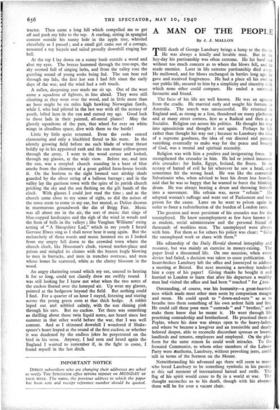A MAN OF THE PEOPLE
By J. J. MALLON
THE death of George Lansbury brings a lump to the thr,at. He was always a kindly and lovable man. But in his hey-day his partisanship was often extreme. He hit hard :nd without too much concern as to where the blows fell, and he made enemies. Later in life extreme partisanship died zi-A iy. He mellowed, and for blows exchanged in battles long age. he gave and received forgiveness. He had a place all his owr in our public life, secured to him by a simplicity and sincerity IA irh which none other could compare. He ended a unive.,a1 favourite and friend.
The facts of his life are well known. He was an agit, - from the cradle. He married early and sought his fortunc n Australia. The search was unsuccessful. He returned :3 England and, as strong as a lion, thundered on many platform and at many street corners, first as a Radical and then a, a Socialist. Religion cut across his politics. He thought his v,tv into agnosticism and thought it out again. Perhaps he Liz rather than thought his way out ; because to Lansbury the IL of a supreme goodness, the idea of our discord and pen ...v vanishing eventually to make way for the peace and bou,.'v of God, was a mental and spiritual necessity.
Religion was with him a positive and invigorating force, it strengthened the crusader in him. He led or joined innumer- able crusades: for India, Egypt, Ireland, the Boers. In an ecstasy of hatred of evil he hit wherever he saw a head, and sometimes hit the wrong head. He was like the converted Salvationist who, when advised to beat his drum less heavily, said that he was so happy that he wanted to burst the blinking drum. He was always beating a drum and throwing himself into a movement. His refrain was, never "refrain." He adopted woman's suffrage and went out of Parliament and into prison for the cause. Later on he went to prison again in order to force a redistribution of the burden of London rates.
The greatest and most persistent of his crusades was for the unemployed. He knew unemployment as few have known it: as student, social administrator and the personal friend of thousands of workless men. The unemployed were always with him. For them as for others his policy was clear : "Give the unemployed work or share with them."
His editorship of the Daily Herald showed intrepidity and resource, but was mainly an exercise in money-raising. The paper lived a threatened life. On one occasion, when every device had failed, a decision was taken to cease publication. A heart-broken Lansbury left the office and journeyed to address a meeting at Bristol. But next morning a newsboy tendered him a copy of his paper! Giving thanks he bought it and hurried to London to learn that after his departure a wealthy man had visited the office and had been " touched " for Lroo.
Outstanding, of course, was his humanity—a great-hearted- ness which made most other men seem by comparison meagre and mean. He could speak to " down-and-outs " so as to breathe into them something of his own ardent faith and fire. He could call these poor men " comrade " and "brother," and make them know that he meant it. He went through fife practising comradeship and brotherhood. He practised them at Poplar, where his door was always open to the heavy-laden, and where he became a lawgiver and an irresistible and dearly beloved despot, able to reconcile discordant spouses or lovers, landlords and tenants, employers and employed. On the plat- form for the same reason he could work miracles. To the frenzied Communist, to whom other members of the Labour Party were anathema, Lansbury, without provoking jeers, could talk in terms of the Sermon on the Mount.
Notwithstanding his advanced age there will seem to many who loved Lansbury to be something symbolic in his passing at this sad moment of international hatred and strife. The flag of his spirit would cease to fly in a world at war. The thought reconciles us to his death, though with his absence there will be for ever a vacant chair.






























 Previous page
Previous page